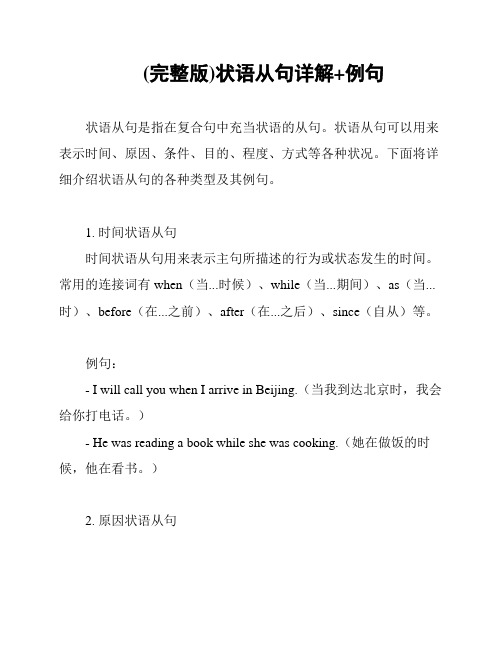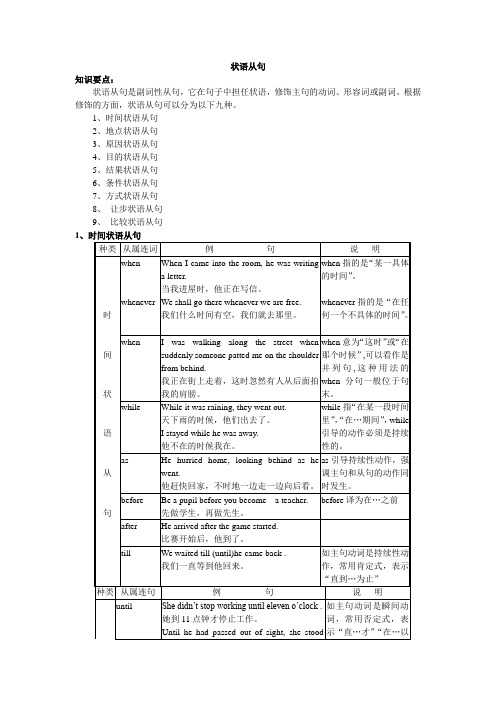状语从句
状语从句(完整版)

While there is life there is hope. (while = __a_s_l_o_n_g_a_s_ )
状语时用来修饰 动 词, 形容 词, 副 词或 句子 的一种句子成分。它可以表示时间、地点、 原因、目的、结果、条件、让步、比较、方式等。 当充当状语的部分是一个句子时,也就是状语从
句。分类如下:
状语从句
1. 时间状语从句 2. 地点状语从句 3. 原因状语从句 4. 条件状语从句 5. 让步状语从句 6. 目的状语从句 7. 结果状语从句 8. 方式状语从句 9. 比较状语从句
I had no sooner begun to talk than he rang off. No sooner had I begun to talk than he rang off. 我还未来得及讲话,他就挂断了电话。
1. I was so familiar with him that I recognized his voice
考点:名词短语引导时间状语从句
• 1. When every time I was in trouble, he would come to help me.
• 2. At next time you come, do remember bring your son here.
• 3. For the first time I met the girl. I felt in love with her.
c.f. He might be ill, for he didn’t come to
状语从句(9种

1.时间状语从句常用引导词:when, as, while, as soon as, before, after, since , till, until特殊引导词:the minute, the moment, the second, every time, the day,the instant, immediately , directly, no sooner … than, hardly …when, scarcely … whenI didn’t realize how special my mother was until I became an adult.While John was watching TV, his wife was cooking.The children ran away from the orchard(果园), the moment they saw the guard.No sooner had I arrived home ,then it began to rain.Every time I listen to your advice, I get into trouble.2.地点状语从句常用引导词:where特殊引导词:wherever, anywhere, everywhereGenerally, air will be heavily polluted where there are factories.Wherever you go, you should work hard.地点状语从句§4地点状语从句 (adverbial clause of place) 地点状语从句一般由连接副词where, wherever等引导,已经形成了固定的句型,例如:句型1:Where+地点从句,(there)+主句。
【注意】此句型通常译成“哪里……哪里就……”;主句在从句后面时,there可用可不用;如果主句在从句的前面时,一般都不用there。
(完整版)状语从句详解+例句

(完整版)状语从句详解+例句状语从句是指在复合句中充当状语的从句。
状语从句可以用来表示时间、原因、条件、目的、程度、方式等各种状况。
下面将详细介绍状语从句的各种类型及其例句。
1. 时间状语从句时间状语从句用来表示主句所描述的行为或状态发生的时间。
常用的连接词有when(当...时候)、while(当...期间)、as(当...时)、before(在...之前)、after(在...之后)、since(自从)等。
例句:- I will call you when I arrive in Beijing.(当我到达北京时,我会给你打电话。
)- He was reading a book while she was cooking.(她在做饭的时候,他在看书。
)2. 原因状语从句原因状语从句用来表示主句所描述的行为或状态的原因。
常用的连接词有because(因为)、since(因为)、as(由于)、for (因为)等。
例句:- I can't go to the party because I have to work.(我不能去参加派对,因为我得工作。
)- Since it is raining, we should stay at home.(由于下雨了,我们应该待在家里。
)3. 条件状语从句条件状语从句用来表示主句所描述的行为或状态的前提条件。
常用的连接词有if(如果)、unless(除非)、whether(无论)、provided(倘若)等。
例句:- If it rains tomorrow, we will stay indoors.(如果明天下雨,我们会呆在室内。
)- We can go shopping unless it is too late.(除非太晚,否则我们可以去购物。
)4. 目的状语从句目的状语从句用来表示主句所描述的行为或状态的目的。
常用的连接词有so that(以便)、in order that(为了)、lest(免得)等。
状语从句完整版

间
状
when
I was walking along the street when suddenly someone patted me on the shoulder from behind.
我正在街上走着,这时忽然有人从后面拍我的肩膀。
when意为“这时”或“在那个时候”,可以看作是并列句,这种用法的when分句一般位于句末。
万一我忘了,请提醒我一下。
So far as I know, the book will be published next month.
据我所知,那本书下月出版。
unless从句的谓语只能用肯定式。unless和if…not同义,unless是书面语,if…not是口语,通常二者可以换用。
条件状语从句中的谓语动词的时态一般要用现在时或过去时代替一般将来时或过去将来时。
他的行动就好象什么也没有发生。
They treat the black boy as if (though) he were an animal.
他们对待这黑孩子仿佛他是一头牲口。
此处as译为,按照或正如
as if或as though的意义和用法基本一样。从句中可以用现在时表示可能符合事实,也可以用虚拟语气。
It is so interesting a novel that all of us want to read it.
这是一本十分有意思的书,大家都想看。
such…that的such后面跟名词,如果名词是单数就要用such a /an…that还可以转换用so…that,语气较强
种类
从属连句
例句
说明
即使明天下雨,我也要去。
状语从句

8.由as long as和so long as 引导的时间状语从句。这两个连词表示 “有多久……就多久”,通常译为“只 要”。 你可以随意到哪里去,只要在天黑以前回 来就行。 You can go where you like as long as you get back before dark. I will fight against these conditions as long as there is a breath in my body! 只要我一息尚存,我就要反对这种境况。
7.由each time, every time和whenever Each time he came to Harbin, he would call on me. 他每次来哈尔滨,总是来看我。 Whenever that man says“To tell the truth”, I suspect that he's about to tell a lie. 每当那个人说“说实在话”的时候,我猜想 他就要说谎了。 You grow younger every time I see you. 每次遇到你,见你更年轻了。
I worked until he came back. 我工作到他回来为止。 I didn't work until he came back. 他回来我这才开始工作。
4.由since引导的时间状语从句。 since引导的从句的谓语动词可以是延续性 的动词,又可以是瞬时动词。一般情况下, 从句谓语动词用一般过去时,而主句的谓 语动词用现在完成时。但在It is +时间+ since从句的句型中,主句多用一般现在时。 自从你离开以来,我一直在北京了。 I have been in Beijing since you left. 我妹妹不在北京住有四年了。 It is four years since my sister lived in Beijing.
状语从句的种类和用法详细分析

状语从句的种类和用法详细分析状语从句是英语语法中的一种从句,它在句子中充当状语的作用,用来修饰谓语动词或整个句子。
本文将详细介绍状语从句的种类和用法。
一、时间状语从句时间状语从句用来表示一个动作或事件发生的时间,它的引导词有:when, while, as, before, after, since等。
例如:1. When I arrived at the office, everyone had already left.2. After she finished her homework, she went to bed.二、原因状语从句原因状语从句用来表示一个动作或事件的原因,它的引导词有:because, since, as等。
例如:1. He couldn't attend the meeting because he was sick.2. Since it was raining heavily, we decided to stay at home.三、条件状语从句条件状语从句用来表示在特定条件下会发生的情况,它的引导词有:if, unless, provided that等。
例如:1. If it rains tomorrow, we will stay indoors.2. Unless you study hard, you won't pass the exam.四、方式状语从句方式状语从句用来表示一个动作或事件的方式,它的引导词有:as, like等。
例如:1. You should do it as I told you.2. He acted like he didn't care about anything.五、地点状语从句地点状语从句用来表示一个动作或事件的地点,它的引导词有:where, wherever等。
例如:1. I will go wherever you go.2. The children played in the park where their parents could watch them.六、目的状语从句目的状语从句用来表示一个动作或事件的目的,它的引导词有:so that, in order that等。
八种状语从句

八种状语从句状语从句在句中作状语,修饰主句中的动词、形容词和副词等。
按其作用和意义可分为时间、原因、目的、结果、条件、让步、方式、比较八种。
下面对这八种从句的要点加以总结。
一、各类状语从句的引导词及易混词的区别。
1. 时间状语从句1) 引导词(1)表示“当……时候”:when, while, as, whenever(2)表示“一……就……”:as soon as(3)其它:after, before, since, until, by the timeWhenever he comes, he brings a friend. 他每次来都带个朋友。
I want to see him as soon as he arrives. 他一来我就要见他。
I went to bed after I finished my homework. 我做完家庭作业之后才睡觉。
2) 易混引导词when, while, as 的区别when既可指“时间点”,与瞬时动词连用,也可指“时间段”,与延续性动词连用(这时可与while互换)。
如:When he came in, his mother was cooking. 他进来时,他妈妈正在烧饭。
When(While)we were at school, we went to the library every day. 我们在校求学时,每天都到图书馆去。
while 只表示时间段,因此while从句的谓语动词要用延续性动词。
Please don' t talk so loud while others are talking. 别人在工作时,切勿大声讲话。
as 与when 用法相似,但着重强调主句动作与从句动作同时发生,有“随着……”或“一边……一边……”之意。
She sang as she went along. 她边走边唱。
As you get older, you get more knowledge.随着年龄的增长,你获得的知识就越多。
英语九大状语从句

英语九大状语从句:1.时间状语从句(Time adverbial clause):指定一个时间点或时间段。
例如:I will call you when I get home.(我回家后会给你打电话。
)2.地点状语从句(Place adverbial clause):指定一个地点或位置。
例如:She looked for her keys where she last saw them.(她在上次看到它们的地方找钥匙。
)3.原因状语从句(Reason adverbial clause):提供一个原因或解释。
例如:She didn't come to the party because she was feeling sick.(她因为感觉不舒服所以没有来参加派对。
)4.结果状语从句(Result adverbial clause):表达一个结果或效果。
例如:He studied hard, so he passed the exam.(他努力学习,所以考试通过了。
)5.条件状语从句(Conditional adverbial clause):表示一个条件。
例如:If it rains tomorrow, we will stay indoors.(如果明天下雨,我们会呆在室内。
)6.比较状语从句(Comparison adverbial clause):进行比较。
例如:He sings better than anyone else I know.(他唱得比我认识的任何人都好。
)7.目的状语从句(Purpose adverbial clause):表示一个目的或意图。
例如:I bought groceries so that I can cook dinner.(我买了杂货,这样我就能做晚饭了。
)8.方式状语从句(Manner adverbial clause):描述一个行为或方式。
例如:She speaks as if she knows everything.(她说话的样子好像她什么都知道。
- 1、下载文档前请自行甄别文档内容的完整性,平台不提供额外的编辑、内容补充、找答案等附加服务。
- 2、"仅部分预览"的文档,不可在线预览部分如存在完整性等问题,可反馈申请退款(可完整预览的文档不适用该条件!)。
- 3、如文档侵犯您的权益,请联系客服反馈,我们会尽快为您处理(人工客服工作时间:9:00-18:30)。
一.No less than , not less than, no more than, not less than 的区别:no less than不亚于,竟达……之多 1)The audience was no less than five thousand. 听众有五千人之多。
2)That hotel probably costs no less than 20 dollars a night. 那间旅馆的住宿费大约要20元一晚呢。
not less than不比……差,至少 1)I'll stay here not less than three days. 我将待在这里至少三天。
no more than同样不;仅仅,只有 1)He is no more than a worker. 他仅仅是个工人。
2)It's no more than a misunderstanding. 这只是个误会。
3)It is no more than ten minutes' walk from the station. 由车站走到这里只有十分钟的路程。
not more than不比……更,不如;至多 1)He is not more diligent than you are.他不象你那样勤奋。
(重点在you are diligent 。
他也勤奋,但不如你勤奋。
) 2)I'll stay here not more than three days. 我将待在这里最多不超过三天。
no less .. than不少于,不亚于 1) He is no less a person than a minister他的身分不亚于部长。
not less than 至少和…一样 1)She is not less beautiful than Mary她至少和玛丽一样美丽。
二.Through, across, cross, over的区别:答:1.across是介词通常在用go,run,swim.等搭配,强调从一定范围的一边到另一边,且在物体表面上或沿着某一条线的方向而进行的动作,其含义常与介词on有关,常和表示“走”一类的动词(如:walk,run,fly,jump 等)连用。
Go across the bridge,and you’ll find the park.越过这座桥,你就会找到公园。
The little girl ran across the road.这个小女孩横穿马路。
2. cross是动词,表示“穿过、越过、渡过”。
The old man is crossing the road.这位老人正在穿过马路。
Be careful when you cross the street.过街时你要小心。
3. through是介词,表示从某一范围的一端到另一端,但它表示的动作是在内部空间进行的,往往指穿过沙漠、森林、窗户等。
The river runs through the city.这条河从这座城市中间流过。
Can you see it through this hole?你能透过这个洞看到它吗?through与cross的不同在于through是直过cross是横过例:I went across the road = I cross the road我横过马路(经斑马线)The car went through the road汽车经过马路(沿着马路)4. over是介词,用作“穿过、通过”时,表示到达高的障碍物(如树、墙、篱笆和山脉等)的另一侧。
He jumped over the wall.他跳过了墙。
The horse jumped over the fence.马跳过栅栏。
注意:如果不强调动作,只说明处于墙、篱笆或山等障碍物的另一侧时,over和across也可互换。
If we can be over/across the mountain before 8 o’clock,we can be helped.如果我们八点前能到达山那边,我们就能获救。
三.状语从句大PARTY状语从句指句子用作状语时,起副词作用的句子。
它可以修饰谓语、非谓语动词、定语、状语或整个句子。
根据其作用可分为时间、地点、原因、条件、目的、结果、让步、方式和比较等从句。
状语从句一般由连词(从属连词)引导,也可以由词组引起。
从句位于句首或句中时通常用逗号与主句隔开,位于句尾时可以不用逗号隔开。
一、时间状语从句要点: 时间状语从句,由以下连词引导:when while as after before as soon as since till /until by the time 在时间状语从句中,要注意时态一致。
一般情况下主句是将来时的时候,从句要用一般现在时。
when当。
的时候Mozart started writing music when he was four years old.(当)莫扎特的时候,开始写音乐作品。
2.while当。
时He visited a lot of places while he was traveling.他在旅途中参观了许多地方。
3.as在。
的同时;一边。
一边。
He smiled as he stood up.他一边站起来一边笑着。
4.after在。
之后He left the classroom after he had finished his homework the other day.前几天做完作业之后回的家。
5.before 在。
之前Mr. Brown had worked in a bank for a year before he came here. 布朗先生来这之前已经在一家银行里工作一年了。
6.as soon as 一。
就。
We began to work as soon as we got there.我们一到那就开始工作。
I will write to you as soon as I get home.我一到家就给你写信。
来源:7.since 自。
以来到现在表示自过去的一个起点时间到目前(说话时间)为止的一段持续时间。
主句一般用现在完成时,从句用一般过去时。
Mr Green has taught in that school since he came to China three years ago.自格林先生来中国以来,他就在这所学校教书。
(还可以用作介词,本句从句还可以用短语:since three years ago(自三年前以来)表示。
)8 till /until都可以作连词,连接时间状语,也可以作介词,与其它词构成介词短语,在句中作状语。
They walked till /until it was dark.他们一直走到天黑。
Xiao Ming didn’t leave home till / until his father came back.小明直到他爸爸回来才离开家。
by the time 到。
为止(所在句子的主句应用完成时)By the time he gets there , his father has already gone.他到家的时候,他爸爸已经走了。
By the time I got to school, the class had already began.我到校时,已经开始上课了。
难点——as when while的辨析as when while都表示主、从句动作同时发生,三者差异如下:表示“一边。
一边"的意思as 强调两个动作同时进行,并表示对比时用于发生时间较段时when 1、还可以表示从句动词的动作在主几句动词的动作"之前"或"之后"发生。
2、when=and then; at that moment (正在那个时候)while 1、用于时间较长时2、强调两个动作同时进行,并表示对比时,有时这三个连词可以互换,有时不可以。
It was raining hard when (as) I got there.我到那里时,正在下大雨。
( 动作同时发生,when可换为as, 但不能换为while,因为get是点动词.)When I had read the article, he called me.我看完这篇文章之后,她给我打了电话。
( 从句动作发生在主句之前,注意时态表达,只能用when )When I got to the cinema, the film had begun.(当)我到了电影院时,电影已经开演了。
(从句的动作发生在主句之后,只能用when,并要注意时态)He was about to leave, when the telephone rang.他正要离开,忽然电话响了。
( 此时不能放在句首。
主句动词一般表达“正在” “即将”.while, as不能代替) 考点She thought I was talking about her daughter, while, in fact, I was talking about my daughter.他以为我在谈她女儿,然而,实际上在谈论我女儿。
(表转折,对比,when, as都不能代替它) 考点While the alien was buying a souvenir, the girl called the police.外星人买纪念品时,那女孩给警察打了电话。
(表示主句,从句的动作同时发生,while后引导的状语从句的动词必须是延续动词不能是点动词,因为它表示较长时间)考点Mother was worried because little Alice was ill, especially as (when/ while) father was away.妈妈担心,因为小爱丽丝病了,特别是他父亲不在家的时候。
(此时as ,when, while可通用)知识扩展 1. It is since从。
以来多长时间了(因为since +从句或名词,表示一段时间)It is five years since we met last time.从我们上次见面已经五年了。
2. It is +before…(。
才) It was a long time before I went to sleep again.过了很长时间我才睡着。
It was an hour before(=until) the police arrived.过了一个小时,警察才来。
二、条件状语从句要点:表示状语从句由连词if, unless (=if not) 引导。
